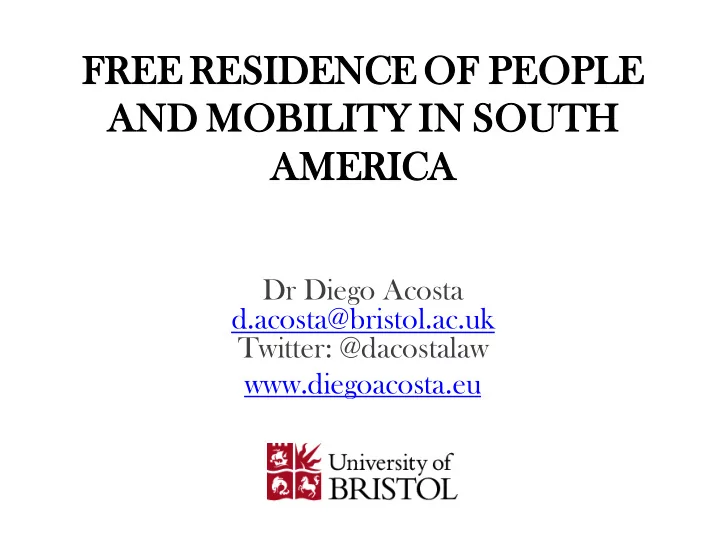

FREE E RESID IDEN ENCE OF PEOPLE AND MOBIL ILIT ITY IN SOUTH AMERI ERICA Dr Diego Acosta d.acosta@bristol.ac.uk Twitter: @dacostalaw www.diegoacosta.eu
Discourse • The hu human right to to migration and the recognition of migrants as subjects of Law, must be at the centre of State’s migration policies. In line with this, we claim the uncondi nditiona nal res espec pect of of the he Human Rights of of migrants … and we condemn all xenophobic, discriminatory and racist acts … regardless of their migratory status, and reject any ny attempt to to crimina nalize irregular migration.
Translation into Law • National level: Several migration laws, several Constitutions. – Non criminalization of irregular migration. – Right to migrate as a fundamental right. – Open borders. • Regional level. Free Residence of people and posible future South American citizenship.
Two claims • Innov ovat ative • Exception onal
Hajime Narukawa´s map
1980s back to democracy • HRs intruments ratification. • Emigration countries (Dictatorships, 1980, turn of the century). • Reassesment of the emigrant: from traitor to hero (dual citizenship, voting abroad). • Many undocumented. • Reassesment of regional integration. • Demands of better treatment addressed to EU and USA. • Restrictive laws unconfortably coexisting with new Constitutions.
New Laws • Non-criminalization of irregular migration (chapter 5). • Right to migrate as a fundamental right (chapter 6). • Open borders (chapter 7). • Yuxtaposition.
MERCOSUR Residence Agrement • End irregular migration- • No right of entry but only residence. • Applies to all South America, except Sur, Guy and Ven. • Temporary Residence Permit for 2 years. • If clean criminal record. • Permanent Residence Permit after 2 years (but Uruguay) • If sufficient resources. • Else fall back into national law and possible irregularity. • Right to work, family reunification and civil rights among others.
Challenges • Incongruity between different instruments • Implementation. • Adjudication. • Scope, who is included? Extra-regional? • A new form of market citizenship or conditions? • A temporal regime? • Dialogue between regions outside Europe. Understanding Narratives.
Thank you! Questions and Comments Dr Diego Acosta d.acosta@bristol.ac.uk Twitter: @dacostalaw www.diegoacosta.eu Dr. Diego Acosta
Recommend
More recommend